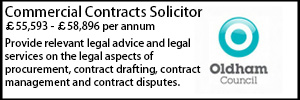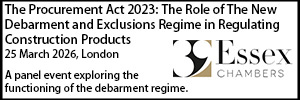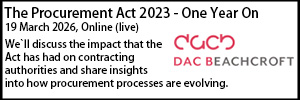Extreme urgency?
- Details
The judicial spotlight is now trained on Regulation 32(2)(c) and the direct award of contracts on the basis of extreme urgency, writes Rachel Whitaker.
As noted in our earlier legal opinion the news that the Good Law Project has brought judicial review proceedings against the Department for Health and Social Care in respect of its direct award of a £108m contract for PPE in April is putting the use of Regulation 32 of the Public Contracts Regulations 2015 (Regulations) under the spotlight.
This raises a number of issues for contracting authorities. Firstly, the impact of any ruling in this matter and the precedent it sets could have a significant impact on contracting authorities’ ability to rely on this provision to directly award contacts going forward. Of course, it may also be that it provides greater freedom to do so.
Secondly the fact that questions are being asked about the appropriateness of reliance on Regulation 32(2)(c) now means contracting authorities up and down the country may face scrutiny over any decisions they have taken or subsequently take to directly award contracts. This type of questioning and scrutiny may become more prevalent in those sectors where the economic impact of the Pandemic are being felt the most.
The scope of Regulation 32(2)(c)
During the UK wide response to the COVID-19 pandemic many UK public sector bodies have found themselves needing to place contracts with suppliers and service providers on an urgent basis and Regulation 32 provided the legal basis on which they might be able to do so without contravening the Regulations. In fact as the Pandemic took hold procurement professionals up and down the country were thankful that the Regulations were tailor made to deal with this situation. The Cabinet Office also issued guidance in the form of PPN 01/20 which provided a steer as to when it might be appropriate to rely on the extreme urgency provisions.
By way of reminder Regulation 32(2)(c) provides that a contract may be directly awarded:
“insofar as is strictly necessary where, for reasons of extreme urgency brought about by events unforeseeable by the contracting authority, the time limits for the open or restricted procedures or competitive procedure with negotiation cannot be complied with.”
The caveat to that is “the circumstances invoked to justify extreme urgency must not in any event be attributable to the contracting authority.”
There a number of component parts to Regulation 32(2)(c) all of which must be satisfied to ensure that a direct award on this basis is legally sound. On the face of it a pandemic would seem to easily satisfy the requirement for the events to be unforeseeable by the contracting authority. Furthermore, most people can accept that such a situation is likely to require contracting authorities to act quickly in awarding contracts for reasons of extreme urgency such as being able to mobilise additional health and social care services to support a public health response. Nevertheless Regulation 32(2)(c) does not afford contracting authorities carte blanche to directly award contracts as and when they consider it necessary even in situations extreme as the one the country currently finds itself in. For example, whilst a situation such as a pandemic could reasonably be considered to be an unforeseeable event before it takes hold, it is arguable that is ceases to be unforeseeable some months later even if it effects are still being felt. At that point contracting authorities might have had time to map out their response and determine the support and/or services they would need to contract for and plan accordingly including conducting procurements where necessary.
In order to rely on Regulation 32(2)(c) it is also necessary to show that the time limits for an open or restricted or a competitive procedure with negotiation cannot be complied with. However, the time limits imposed in respect of each of these procedures are not set in stone and the Regulations include some flex to allow them to be reduced in certain circumstances. It is, therefore, not without possibility that two months into a pandemic response a contracting authority would have had time to run an accelerated procurement procedure in compliance with the Regulations.
Whether or not Regulation 32(2)(c) can be relied on in a given situation will always turn on the specific facts, the nature of the contract and when the need for it became apparent. However, a failure to make out any single aspect of the Regulation 32(2)(c) test would likely be sufficient to undermine reliance on it and given the number of component parts to it, that might not be too difficult to achieve.
Another issue we expect to see come to the fore in this litigation is whether the length of the contract awarded was acceptable. It is generally accepted that when relying on Regulation 32(2)(c) contracts should be awarded for no longer than is necessary to allow the contracting authority to address the immediate issues and run a competitive process. Again what is reasonable and acceptable will need to be looked at on a case by case basis and even if 12 months is considered reasonable and compatible with Regulation 32(2)(c) in the context of the DHSC’s directly awarded contract that is not to say it would be in all circumstances.
Market motivation for challenge
Many contractors are suffering economically as a result of the Pandemic meaning that they are fighting to protect the contracts they hold but also questioning the award of those they have lost out on. Losing out on potential business to a direct award to a competitor could be sufficient motivation to look a bit more closely at exactly what the contracting authority has done and ask some tricky questions. Therefore, contracting authorities who are still seeking to award contracts in relation on Regulation 32(2)(c) should give careful consideration to the full facts of the situation before coming to a decision as to how to proceed.
For now, whilst we wait to see how this challenge plays out, the key points to take away when seeking to rely on Regulation 32(2)(c) are:
- Consider the use of Regulation 32(2)(c) specifically as against the facts of the situation
- Consider each aspect of Regulation 32(2)(c) and ensure it has applies in the circumstances
- Maintain a complete audit trail of the decision taken and the reasons for it
- Be clear in any subsequent contract award notice as to why Regulation 32(2)(c) is applicable in that given scenario.
Rachel Whitaker is a Senior Associate at Browne Jacobson. She can be contacted on 0115 976 6538 or
Sponsored articles
Walker Morris supports Tower Hamlets Council in first known Remediation Contribution Order application issued by local authority
Unlocking legal talent
Senior Solicitor - Property
Legal Officer
Legal Director - Government and Public Sector
Locums
Poll
15-07-2026 11:00 am

















































